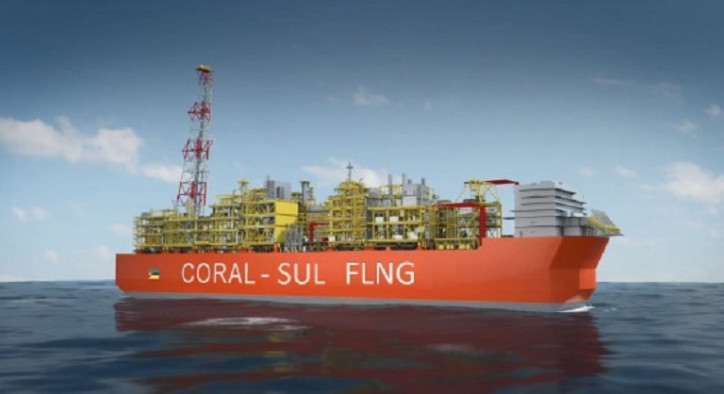Eni has started installation works on the hull of the Coral Sul floating liquefied natural gas (FLNG) treatment and liquefaction unit that will be moored offshore in Mozambique. The unit is part of the Coral South project, which will put in production 450 billion cubic meters of gas from the giant Coral reservoir. The hull is expected to be launched in 2020, in line with the planned production startup of the Coral South Project in 2022.

The Coral Sul FLNG facility will have a gas liquefaction capacity of 3.4 million tons per year when completed and will be the first FLNG vessel ever to be deployed in the deep waters of the African continent. The vessel, which will be 432 metres long and 66 metres wide and weigh about 220,000 tons, will be able to house up to 350 people in its eight-storey accommodation module. The facility will be anchored at a water-depth of around 2,000 metres by means of 20 mooring lines that weigh a combined 9,000 tons.
Construction works on the Coral Sul FLNG started in 2018 and are ongoing in seven operational centres across the world. Construction of the mooring turret began in March; construction of the hull’s 24 modules that contain the LNG storage tanks and sections of the treatment facilities began in September. Construction of the topside, consisting of 12 gas treatment and LNG modules, started last November, along with the living-quarters. By the end of 2019 the overall progress of the project is expected to exceed 60% completion with the total man-hours worked shortly expected to reach 10 million.
Drilling and completion activities for the six subsea wells that will feed the liquefaction unit will begin in September 2019. The wells will have an average depth of approximately 3000 metres and will be drilled in about 2000 metres of water depth. The activities, carried out by the SAIPEM 12000 drilling rig, will be completed by the end of 2020.
Alongside the LNG infrastructure under construction, the Coral South project also includes a number of initiatives aimed at enhancing the overall capabilities of the local workforce. These include specialized training activities for over 800 Mozambicans, who will eventually be employed during the operational phase of the project. Eni is also engaged in a broad programme of social, economic and health care initiatives, to support a long-term, diversified and sustainable development of the local communities.
Eni has been present in Mozambique since 2006, with the acquisition of a participation interest in the exploration concession of Area 4, located in the deep offshore in the Rovuma basin, in the north of the country. Between 2011 and 2014, Eni discovered supergiant natural gas resources in the Coral, Mamba Complex and Agulha reservoirs, holding estimated 2,400 billion cubic metres of gas in place.
Source: Eni